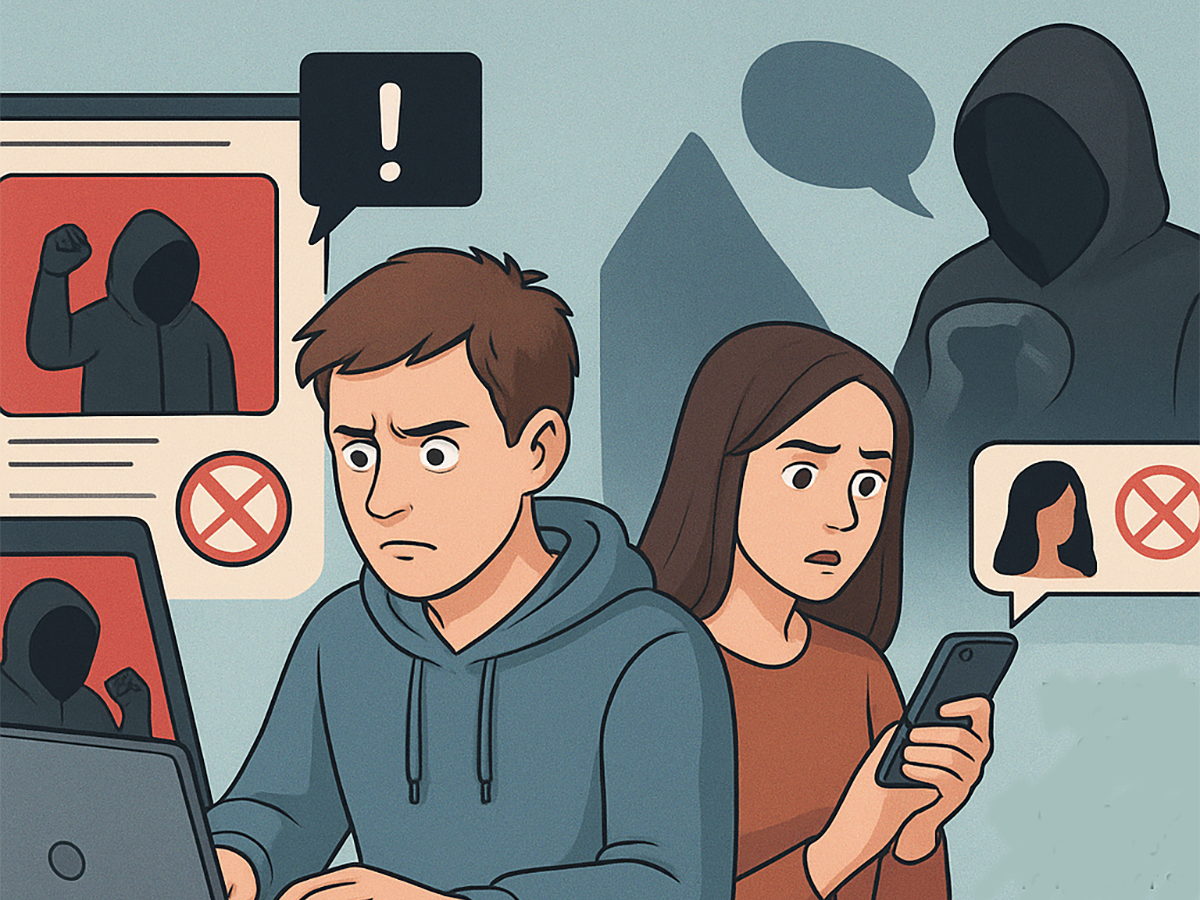


One of the most common forms of online radicalisation is political extremism, which often begins with exposure to highly polarised content, conspiracy theories, or far-right and far-left ideologies (Douglas, Uscinski, & Sutton, 2019). Individuals may join online forums or groups that reinforce anti-government or exclusionary views. Over time, this can lead to frequent engagement with radical pages, sharing divisive material, and showing hostility toward differing opinions.
Another significant type is religious or ideological radicalisation, where individuals encounter material promoting violent or exclusionary belief systems. Encrypted chat groups or closed online spaces can be used to recruit vulnerable individuals into extremist causes (Davey et al., 2020). Those affected may withdraw from social circles, develop an intense fixation on a single ideology, and begin to glorify ideological martyrdom or violence.
Misogynistic or gender-based radicalisation has also become increasingly visible online. These spaces frequently normalise hostility toward women and reinforce male victimhood narratives. Exposure to such content can lead individuals to adopt extreme gendered worldviews, express resentment in online interactions, and isolate themselves from supportive peers (Frischlich, 2021).
A further form is conspiracy-oriented radicalisation, which occurs when individuals are exposed to content linking unrelated events into conspiratorial narratives. These often leverage fear and uncertainty, portraying the world as secretly controlled by hidden forces (Douglas et al., 2019). During the COVID-19 pandemic, misinformation networks significantly amplified such conspiracy content, spreading distrust of authorities and mainstream evidence (Hussein, Juneja, & Mitra, 2020). Those influenced by such material may become obsessed with alternative news sources and reject traditional forms of knowledge or expertise.
Digital platforms play an active role in the radicalisation process. Algorithmic reinforcement exposes users to progressively extreme content based on their previous engagement patterns (Fisher, 2021). Over time, this can create echo chambers, which are closed online environments that amplify beliefs while excluding alternative perspectives (Frischlich, 2021). Social and emotional vulnerability also contributes, as people experiencing isolation, anger, or fear may seek belonging in extremist communities (Davey et al., 2020). Private or encrypted communication channels further conceal behaviour from friends and family, allowing radicalisation to deepen without detection.
Radicalisation often changes a person’s identity and outlook. Initially, it can provide a sense of purpose or belonging, but over time it tends to erode empathy and increase hostility toward others (Frischlich, 2021). Affected individuals may experience heightened stress, paranoia, and emotional isolation. As their thinking becomes more rigid, relationships with friends and family deteriorate, reinforcing dependency on online communities that validate extremist views (Davey et al., 2020).
Warning signs of online radicalisation can include the sudden adoption of extreme political, religious, or social opinions, alongside withdrawal from long-standing relationships. People may frequently share extremist or conspiracy content and become defensive or hostile when others question their beliefs (Douglas et al., 2019). These behavioural shifts are often gradual but can become more visible as the individual becomes more deeply engaged in radical online spaces.
Preventing online radicalisation involves a combination of awareness, education, and proactive communication. It is important to follow a range of credible information sources to avoid algorithmic echo chambers (Fisher, 2021). Critical thinking is essential, particularly when engaging with emotionally charged content designed to provoke anger or fear (Frischlich, 2021). Limiting engagement with extremist material, such as avoiding inflammatory comment threads, can help reduce exposure. Harmful or violent content should be reported using platform tools, while those showing warning signs should be approached with empathy rather than judgement (Davey et al., 2020). Finally, maintaining a healthy balance between online and offline life—through meaningful social connections, exercise, and purposeful activities—helps foster resilience against manipulative online influences (Hussein et al., 2020).
Davey, J., Saltman, E., & Birdwell, J. (2020). Countering online radicalisation: A guide for policy makers and practitioners. Institute for Strategic Dialogue.
Douglas, K. M., Uscinski, J. E., & Sutton, R. M. (2019). Understanding conspiracy theories. Political Psychology, 40(S1), 3–35. https://doi.org/10.1111/pops.12568
Fisher, A. (2021). Radicalisation and the media: Understanding the role of online algorithms in extremist recruitment. Routledge.
Frischlich, L. (2021). #DarkEuphoria: Understanding the appeal of extremist online propaganda. New Media & Society, 23(3), 565–582. https://doi.org/10.1177/1461444820910419
Hussein, E., Juneja, P., & Mitra, T. (2020). Measuring misinformation in online platforms during the COVID-19 pandemic. Harvard Kennedy School Misinformation Review, 1(2), 1–12.
Should you find any content in these articles in any way distressing, please seek support via New Zealand telehealth services.
Seek Help